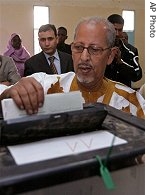2007年VOA标准英语-Analysts Say New Alliance for Mauritania Presid(在线收听)
Dakar
19 March 2007
The third-place finisher in Mauritania's first round of presidential polls, Zeine Ould Zeidane, has thrown in his support for frontrunner Sidi Ould Cheikh Abdellahi for Sunday's elections. While this could be a major boost to Abdellahi's campaign, analysts say they expect the nation's first presidential election since a military coup in 2005 to be close. Kari Barber reports from VOA's West Africa bureau in Dakar.

Mauritanian presidential candidate Sidi Ould Cheikh Abdellahi casts his vote in Nouakchott, 11 March 2007
In announcing his support for the frontrunner, Zeidane said the two had discussed a future government. Zeidane, a former head of the Central Bank, did not say what role he might play in it.
Local analyst Racine Sy says Zeidane's decision to support Abdellahi was not a surprise. Abdellahi served as a minister in the government of toppled leader Maaouiya Ould Taya, which Sy says, was supportive of Zeidane's party.
"They are not surprised because they were thinking something like this could happen because they know that Zeine Ould Zeidane is very close to Ould Cheikh Abdellahi," said Sy. "The former regime supported his party. That is why people are not really surprised about his decision to support Abdellahi."
Sy says the third-place candidate's backing is no guarantee his supporters will cast their votes for Abdellahi.
"People here used to act based on tribal decisions. If the tribe, for example, asked them to vote for a certain candidate, they would do it," added Sy. "This time, no one knows what will happen. It really depends on how Mauritanian's feel about change."
In the first round of voting, held March 11, Abdellahi took nearly 25 percent of the vote and Zeidane took about 15 percent. Ex-opposition leader Ahmed Ould Daddah garnered just over 20 percent of ballots, putting him in second place. No candidate came near the 50 percent needed to win the first round outright.
London-based analyst David Hartwell with Jane's Strategic Advisory Service says Zeidane's support cements Abdellahi's position as the frontrunner. But, he says, winning the votes of black Mauritanians in the ethnically diverse nation could be crucial.
"He has the support of the third-place candidate," said Hartwell. "He has the tacit support of the outgoing military government. I think unless he makes a major mistake in the next week of campaigning, or unless Daddah is able to secure support of other candidates, particularly the black Africans, then Abdellahi is in an extremely strong position."
In the first round, 19 hopefuls vied for the presidency. The only two black candidates, Messaoud Ould Boulkheir and Ibrahima Moctar Sarr, garnered nearly 18 percent of the votes. Neither has announced who he will support.
This marks the first time in Mauritanian history that a presidential election has gone to the second round. The presidential polls represent one step in the military junta's pledge to steer the country toward democracy and return it to civilian rule after they toppled the government of long-time president Ould Taya in August 2005. The first round was widely regarded as free and fair by international observers.